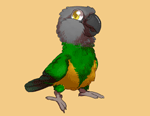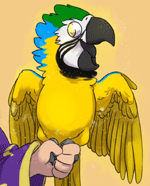 Kili
Type: Senegal Parrot
Genus: Poicephalus
Species: Senegalus
Subspecies: Mesotypus
Sex: Female
Weight: 120 grams
Height: 9 inches
Age: 17 years, 7 months
|
 Truman
Type: Cape Parrot
Genus: Poicephalus
Species:Robustus
Subspecies: Fuscicollis
Sex: Male
Weight: 330 grams
Height: 13 inches
Age: 15 years, 10 months
|
 Rachel
Type: Blue & Gold Macaw
Genus: Ara
Species:ararauna
Sex: Female
Weight: 850 grams
Height: 26 inches
Age: 13 years and 7 months old
|
List of Common Parrots:
Parakeets:
Budgerigar (Budgie)
Alexandrine Parakeet
African Ringneck
Indian Ringneck
Monk Parakeet (Quaker Parrot)
Parrotlets:
Mexican Parrotlet
Green Rumped Parrotlet
Blue Winged Parrotlet
Spectacled Parrotlet
Dusky Billed Parrotlet
Pacific Parrotlet
Yellow Faced Parrotlet
Lovebirds:
Peach Faced Lovebird
Masked Lovebird
Fischer's Lovebird
Lilian's (Nyasa) Lovebird
Black Cheeked Lovebird
Madagascar Lovebird
Abyssinian Lovebird
Red Faced Lovebird
Swindern's Lovebird
Lories and Lorikeets:
Rainbow Lorikeet
Conures:
Sun Conure
Jenday Conure
Cherry Headed Conure
Blue Crowned Conure
Mitred Conure
Patagonian Conure
Green Cheeked Conure
Nanday Conure
Caiques:
Black Headed Caique
White Bellied Caique
Poicephalus Parrots:
Senegal Parrot
Meyer's Parrot
Red Bellied Parrot
Brown Headed Parrot
Jardine's Parrot
Cape Parrot
Ruppell's Parrot
Eclectus:
Eclectus Parrot
African Greys:
Congo African Grey (CAG)
Timneh African Grey (TAG)
Amazons:
Blue Fronted Amazon
Yellow Naped Amazon
Yellow Headed Amazon
Orange Winged Amazon
Yellow Crowned Amazon
Cockatoos:
Cockatiel
Galah (Rose Breasted) Cockatoo
Sulphur Crested Cockatoo
Umbrella Cockatoo
Moluccan Cockatoo
Bare Eyed Cockatoo
Goffin's Cockatoo
Macaws:
Red Shouldered (Hahn's) Macaw
Severe Macaw
Blue And Gold Macaw
Blue Throated Macaw
Military Macaw
Red Fronted Macaw
Scarlet Macaw
Green Winged Macaw
Hyacinth Macaw
Glossary of Common Parrot Terms
|
| | Wednesday September 18th, 2013 |
|
It can be misleading from my videos and blog that owning parrots is a cake walk. It certainly can be a pleasure but it is even more so a challenge. Most of my articles and videos either focus on the good things or help to prevent/resolve the bad ones. But much of the undesirable stuff still goes unnoticed.
My passion for parrots may seem to trump the struggle, but I wanted to write this time about that struggle. It's not easy and sometimes downright aggravating to have birds. The trouble is, that all the problematic things are erratic and hard to demonstrate. If I want to show a cute trick my parrot picked up, I can cue it and show it in person or on video. Other cute behaviors I can usually stage or elicit in some way. The bad stuff, even though frequent enough isn't predictable and cannot be demonstrated on demand. This is why you have to take my written word that it exists nonetheless.
I understand the problems that regular parrot owners encounter because I have to deal with them too. Luckily I have most of it under control but parrots are still wild animals so even with the most trained of parrots these issues can rear their ugly head. I hope to convince you that parrots are difficult creatures but also that issues can be greatly reduced with training. Still, there will always be the fact that you are dealing with a wild, selfish, difficult animal and it is imperative to accept this from the start.
Biting, jealousy, screaming, destroying things, flying away, moodiness, fighting, making a huge mess, and costing a fortune are just some of the difficulties I have to deal with like any other parrot owner. I do everything I can to minimize these issues and make the most of them. Much of my training and efforts with the birds help a lot. I don't even want to begin to imagine what my parrots could have turned out like without the training.

Luckily biting is infrequent with the trained parrots. However, it is not absolutely eliminated. They are still wild animals and some unexpected thing can potentially set them off. Whether it's grabbing on too hard to hang on, an act of jealousy, or just plain startled, these can result in bleeding. One time, Kili was sitting tucked under my chin when Truman decided to fly over and land exactly where she was nestled. She began to throw her beak around in defense but since my face was the closest thing she got me rather than the perpetrator. Another time I got nailed was reaching into Kili's cage to take her out in the morning. Apparently she had just woken up and hadn't had her coffee yet (just kidding) and my hand was unexpected to her when I reached in. Like a pitbull she grabbed on and wouldn't let go. If she were more awake and seen my face, she would have known it was me and would never have done it.

These are rare problems but even with the most trained of parrots possible. This is why a parrot can never be an easy pet. If you don't work with them, they are just wild and horrible. If you work with them extensively, you can only hope to achieve 99%.
Truman on the other hand still gets moody fits once every few months. He'll suddenly be scared of things he has no reason to be and becomes very difficult to manage. Sometimes he throws screaming fits and screams his butt off all day long. Other times he is quiet and sweet. His adolescent age may play a role but it makes it no easier to deal with. The two birds may go months without fighting and then suddenly something sets them off and it is hard to trust them around each other again.
Making things good takes a lot of time and effort. Letting things get bad can happen instantly. You can spend a year taming a parrot with success and then one incident and the bird goes back to distrusting you. This is very difficult to accept. This is why it's important to go into parrot ownership without expecting anything good in return. You must love your parrot and take care of it without any expectation of anything in return. Otherwise you will be led to disappointment. Parrots have no obligation to reciprocate.

The mess is endless. You can clean all you want but there will still be feathers, food bits, toy parts all over the place. Luckily parrot poop is easy to clean and not bothersome. However, there's plenty where it comes from. Be ready for endless cleaning and no cleanliness in sight. Vet bills can get very expensive and the care isn't always effective. The toys and perches are expensive and get depleted in no time (and if they don't then a bored bird can turn to plucking or screaming). These are all troubles that cannot be videoed but are probably familiar to most parrot owners.
Parrots are also extremely time consuming. Not only do you have to cook, clean, and shop for them but you also have to make time to take them out, train them, get them outdoor time, and exercise them. To do this right takes a lot of time on a consistent basis. Then this must be continued for life.
When I do run into problems, I never just accept them. I may accept that an immediate solution is impossible. However, I always apply myself toward a long term solution. Even if it takes years, if I keep working toward it, I can ensure things don't get worse and eventually get solved. Flight, taming, training, socialization, exercise, outdoor time, food management, sleep, etc are all a part of the solution toward most problems. But these come at a cost. The cost of knowledge is the cheapest by far. The more costly is the time and patience that you will have to dedicate with little/nothing in return to improve your parrot's behavior. But ultimately it will be a far more desirable pet than if left to its own wild ways.
So in summary, it may seem from my articles/videos that parrot ownership is easy or nothing but delight. However, even I have to deal with tough birds and understand that it is even harder for others. Owning a pet parrot is a tough job and not one to be taken lightly. It can only suit people seeking a real challenge. Parrots definitely aren't suitable for someone who wants an out of the box pet that will behave as they wish/expect. If you're having a hard time with your bird, realize that you're not alone. But also realize that there is much work to be done to improve behavior.
Check out my book, The Parrot Wizard's Guide to Well-Behaved Parrots for my complete approach to parrot keeping. It discusses everything from choosing a bird to solving behavior problems. I won't say it's easy but I will say that it works for all sorts of parrots. Have some patience, keep informed, and try your best always and you will see your parrot transform into a more desirable companion.
Part of: Taming & Basic Training, General Parrot Care, Cape Parrots, Senegal Parrots
Kili Senegal Parrot Truman Cape Parrot Bite Mess Hardship Training |
|




 Previous Article
Previous Article Next Article
Next Article